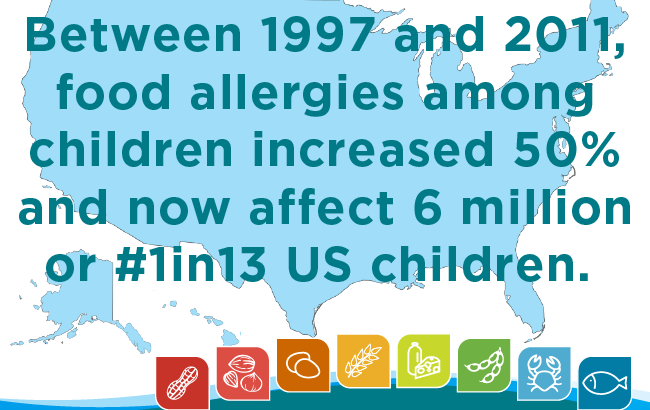Both my kids have multiple food allergy and it is a heavy burden having negative impact on quality of life. Like anyone carrying the weight of an affliction, I soon began to ask: how did this happen? How can it be cured? How can it be prevented?
The title of the post may seem intentionally provocative, but it is the plainest and simplest phrasing of a fundamental question I’ve silently asked ever since I was convinced by solveeczema.org that detergents are the primary cause of my kids’ eczema. My younger child, who had much more severe eczema which started earlier in life, and was exposed to harsher and greater amounts of detergents, is allergic to many more food groups than my older child. How did I make the leap to asking whether detergents were somehow causative of my kids’ food allergies? That’s what this post is about.
Eczema Causes Food Allergy?!
There is a wide and growing body of research looking at the relationship between eczema (also known as atopic dermatitis or “AD”) and food allergy (usually abbreviated in the literature as “FA”). The search terms “atopic dermatitis correlation food allergy pubmed” yield a dizzying array of journal articles documenting a number of questions medical researchers have sought to answer about how AD (eczema) is related to FA (food allergy). Certainly, the literature indicates there is a correlation, an association, between AD and FA. But good scientists know that correlation does not necessarily indicate causation — meaning, just because two things occur together does not mean that one necessarily causes the other.
I was excited to discover a group of researchers had very recently sought to specifically answer the question “is there a causal relationship between eczema and food allergy?”, through a systematic review of existing medical literature — 66 papers, to be exact.
The paper is aptly titled Does atopic dermatitis cause food allergy? A systematic review. and drew this jaw-dropping conclusion:
This systematic review confirms a strong and dose-dependent association between AD, food sensitization, and FA. AD of increased severity and chronicity is particularly associated with FA. There is also evidence that AD precedes the development of food sensitization and allergy, in keeping with a causal relationship.
In as plain English as I can muster while still staying true to what the researchers said, this means:
- “dose-dependent”: the worse the eczema, the higher prevalence of food allergy
- “severity”: more severe eczema is particularly associated with development of food allergy
- “chronicity”: more chronic (ongoing, long-term) eczema is particularly associated with development of food allergy
- “in keeping with a causal relationship”: plainly, eczema appears to cause food allergy
Eczema somehow causes food allergy. This conclusion is HUGE! It isn’t so surprising, though, given the understood immune system mechanisms and how individuals become sensitized to substances (a precursor to developing allergies).
Proposed Mechanism
This news release of the American Academy of Dermatology entitled Dermatologists caution that atopic dermatitis is a strong precursor to food allergies summarizes the proposed mechanism:
Recent research examining the genetic basis of atopic dermatitis has shown that this chronic skin condition is likely related to a defect in the skin’s protective outer layer – known as the epidermal barrier – allowing irritants, microbes and allergens (such as food) to penetrate the skin and cause adverse reactions. Since the skin barrier in patients with atopic dermatitis is compromised and open to absorb proteins, it allows sensitization to certain foods, leading to a positive skin or blood test.
NOTE: It’s important to clarify that my position about people who suffer from eczema or atopic dermatitis is not that they have a inherent defect in their skin, but that they have a genetic predisposition to react to environmental detergents in a way which results in a breakdown of the epidermal barrier severely enough to cause eczema. It’s my belief that it’s not just some people that react to detergents, either, but we’re all affected — on a continuum from dry skin to severe eczematic lesions. These convictions come directly from discussion with AJ Lumsdaine from solveeczema.org about her ideas.
Detergents Cause Skin & Membrane Breakdown
There is a large body of research already showing that detergents damage and destroy skin and membranes. Just a few references here:
In the book Current Technologies to Increase the Transdermal Delivery of Drugs, a section about surfactants/detergents starting on page 30 states:
It is well known that surfactants have effects on the permeability characteristics of several biological membranes, including the skin [67].
and later states that some types of surfactant seem to alter the barrier function of the outer layer of the skin.
A more detailed example, from journal article Surfactants and skin membranes:
When we clean the skin we remove … part of our natural barrier – the stratum corneum. [Skin cells], both singly and in clumps, are released from the skin surface by the action of detergents and mechanical stimulation. So too are the lipids and proteins which make up the [inner region] of the stratum corneum. … Changes in the physical properties of the skin occur after washing. For example, changes in skin surface pH and transepidermal water loss (a sensitive index of barrier function) are easily demonstrable. Excessive exposure to surfactants results in repeated damage to the stratum corneum …
Skin Breakdown from Detergents is A Largely Unrecognized Cause of Eczema
This statement is the crux of the theory proposed by SolveEczema and requires targeted research to prove out. However, it is the experience and conviction of the thousands of families who’ve used that site to solve their child’s eczema. The quotes from papers and textbooks help, but I didn’t need to be convinced that detergents alter the skin barrier and break the skin membrane open to the extent that they actually cause eczema — I saw it on my kids. I saw their skin healed without drugs and moisturizers when I removed detergents, and I saw their skin become red and itchy again when they re-encountered environmental detergents.
Detergents Contribute to Food Allergy Development?
Let me tie my thought process from all of the above together, and present my hypothesis.
1. Detergents damage skin and other membranes, and is a largely unrecognized root cause of eczema, AND
2. Eczema has a causal relationship to development of food allergy.
Drawing it simply (perhaps over-simply!):
Detergents –> Eczema –> Food Allergy
Towards Breaking New Ground in Research on Food Allergy Prevention
From the sum total of my experiences, education and review of the literature, I have a strong conviction that detergents are likely a largely unrecognized but significant causative factor in development of food allergy. This line of inquiry needs directed research to prove out.
I often struggle with the question: What if the researchers were aware of this hypothesis; what if they turned their research towards specifically answering the question “Is the epidemic rise in food allergy correlated to the rise in prevalence of environmental detergents, especially in highly industrialized nations?” (Detergents are more common in industrialized nations, both within homes and institutions for cleaning, and in the environment because of their prevalence in industrial applications. This is a topic for a subsequent post!)
More questions intrigue and haunt me, propelling me into some form of action, starting with laying out my hypothesis here. What if, in posing the hypothesis and carrying out the research, we would be able to answer for the many children and families impacted by food allergy, “Why did this happen?”, and more importantly, “How can we prevent it?”
What if a return to the nearly non-existent rates of food allergy we saw 40 years ago, or wholesale prevention of food allergy, turned out to be something so disarmingly simple, at the very root, as changing what the world uses to clean and wash with?

